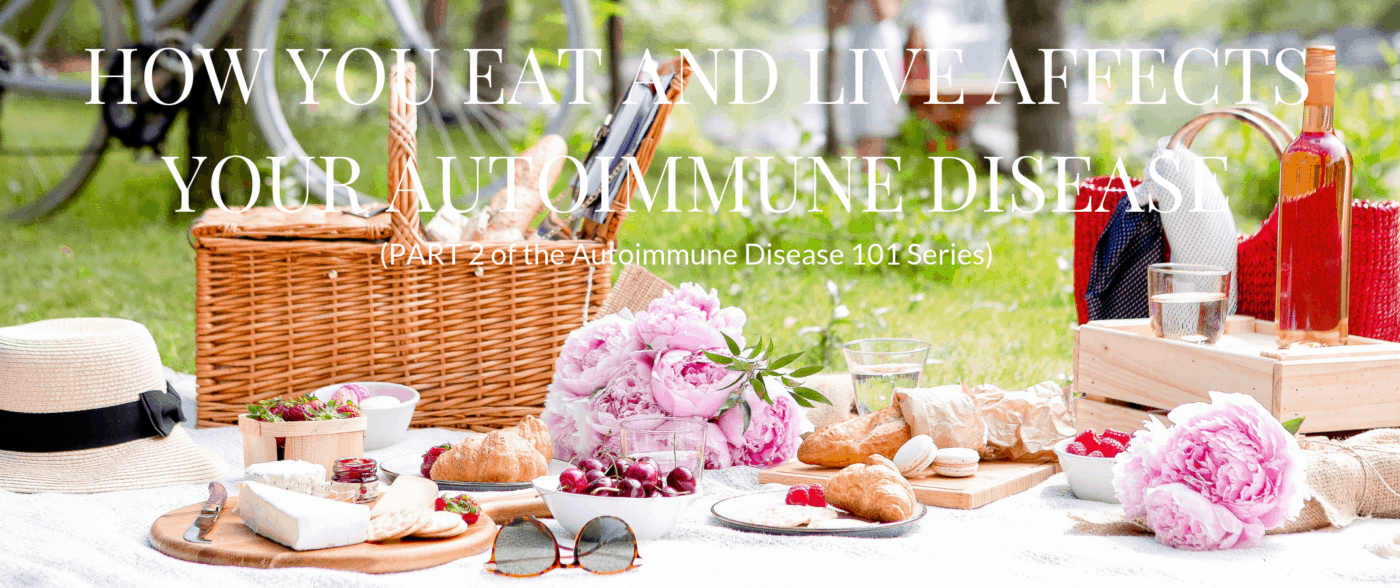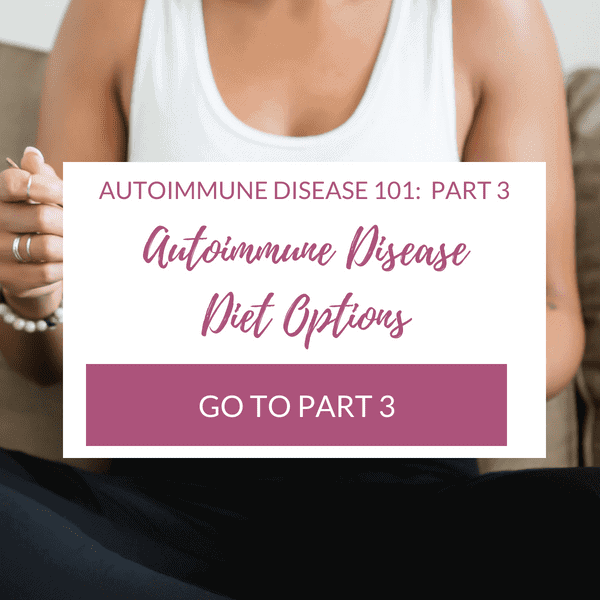
Part 2: How Diet and Lifestyle Affect Autoimmune Disease
Welcome to Part 2 of the free Autoimmune Disease 101 series!
If you missed Part 1 – What is Autoimmune Disease, and aren't familiar with what autoimmune disease is, how to treat it, and want some easy ways to start feeling better now, make sure you go back and watch that.
In this section, we'll be going over how what you eat – and how you live – affect your autoimmune disease. You might be amazed at how much of an effect both of these have on the disease itself and whether or not you experience symptoms.
How Diet Affects Autoimmune Disease
As I mentioned in Part 1, there isn't a specific food or food group that causes autoimmune disease. And it's not like you did something wrong by eating a particular food.
When I say that diet affects your autoimmune disease, it's more that some foods can cause inflammation in the body and a ramped up immune response.
When you have an autoimmune disease, you don't want a ramped up immune response because:
(a) Your body is busy trying to address that “fire” (and most likely several others) and therefore cannot spend the resources to regulate properly. This means any double-checking that you aren't creating autoantibodies (antibodies against self) that attack your own tissue isn't happening.
(b) When you have increased immune response, everything can happen at a much faster pace, and this also means that even MORE autoantibodies may be produced because of the “threat” that your tissue poses
(c) It increases inflammation throughout the body, which then turns into a vicious
By removing particular foods that cause this increased inflammation and immune response, you allow the body and immune system to calm down, repair itself, and stop constantly being on the attack.
How Lifestyle Affects Autoimmune Disease
Remember how I mentioned that gluten is one of the worst things you can eat if you have an autoimmune disease? I said this because it alone can punch holes in our gut, causing leaky gut.
Well, stress can do this too. Just stress alone, with no other factors.
So when you hear “stress kills” or “stress is bad for you”, these people aren't just saying it to say it, they mean it.
This means that stress can be one of the big factors causing your autoimmune disease symptoms to keep going. Therefore it's VERY important to get stress under control.
In addition, there are two other important lifestyle factors you need to consider:
- Sleep
- Exercise
I talked a lot about sleep and why it's so extremely important in the video in Part 1 of this series on 3 Things You Can Do Immediately to Start Feeling Autoimmune Disease Relief. If you haven't seen that, go back and watch it or read the text under the video. Bottom line, during sleep CRITICAL bodily functions happen and without those, your body isn't going to work the way that it should and your immune system will not work properly either.
Make sure though that when you DO sleep that you're practicing good sleep hygiene. This means:
• Use blackout shades in your room to prevent any outside light (like streetlights) from getting in
• No lights in your room (your skin can even absorb light, so even if you don't “see” it, it affects you)
• No bright lights or electronics right before bed. The blue light emitted from these disrupt your normal sleep hormones and make it harder to fall – and stay – asleep. If you must be on some electronic device before bed, it's best to wear some sort of amber blue-blocking glasses and/or install dimming software on your device ( F.Lux or Macs/iOS devices have NightShift now)
• Get plenty of light during the day, especially when you first wake up. I personally walk my dog first thing in the morning without sunglasses to help regulate my sleep and wake hormones.
• Try to keep your room between 62 and 68 degrees Fahrenheit as this has been found to be the optimal sleeping range
• Keep electronic devices out of your room (at the very least, put your cell phone into airplane mode if you must keep it in there with you)
As for exercise, all the experts agree: it's important for your health for a number of reasons. I don't think I need to go into that here.
However, you don't want to do TOO much, but you also don't want to do too little. There's a sweet spot, especially when it comes to your gut health and autoimmune disease.
What's too much?
It kind of depends on you, but
Your body has a hard enough job trying to fight all the inflammation that your disease is causing, and then add to it MORE inflammation and tissue damage from your workout, plus increased chances of leaky gut and dysregulated hormones, this kind of activity makes it difficult to heal.
Read more about how too much exercise hurts your gut
What's too little?
On the other side of the spectrum is too little, and this is when you are a couch potato and don't get in any sort of movement each day. With this your sleep/wake cycle gets messed up, you have a decreased immune system response, and a decreased response to stress. And all those other things the “experts” always talk about.
The Goldilocks Effect
The “just right” amount for someone with an active autoimmune disease? Gentle movement each day, like walking, yoga, pilates, swimming, biking, etc. In fact, walking is one of the most perfect exercises you can do.
The best part of walking is that it doesn't require any sort of special equipment and you can do it just about anywhere. Too hot or cold? Walk around your house, apartment, or office. It all counts.
(See more about walking in this video, and more about doing the sport you love with autoimmune disease in this video)
The Autoimmune Disease Diet Options
Before I get into the autoimmune diet options, let me state that I'm neither a medical professional nor a licensed dietician. So take what I say with that in mind. I'm a health coach and autoimmune disease sufferer who avidly researches all the options out there and have come up with my recommendations based on my training, research, and talking to hundreds of other autoimmune disease sufferers who have started to feel much better using these methods.
Ok, disclaimer stuff out of the way, the diets I recommend, in order of efficacy and also in difficulty, are:
- Gluten-free diet
- Paleo diet
- Whole30
- Autoimmune Paleo Protocol (AIP diet)
I already talked about how gluten is bad, and why a gluten-free diet can help, so I'm not going to go into much detail here. There is an in-depth video on the gluten-free diet in the next part of this series.
The Paleo, Whole30, and AIP diets all operate on the premise that things like grains, legumes, beans, dairy, and processed foods are inflammatory to the body. Again, I go into all of this in more detail in the next section, but here's a
The Paleo diet is a great long-term option that isn't as restrictive as the others and still includes favorites like cakes, pies, pizzas, and waffles. Many people who complete a Whole30 or AIP diet use Paleo as their long-term eating style.
The Whole30 is a 30-day effort that is based on the Paleo
The Autoimmune Paleo Protocol (AIP diet) is the most restrictive but also the most effective at quelling any autoimmune disease activity. In addition to everything Paleo removes, it also removes things like nuts, seeds, coffee, chocolate, eggs, nightshades (things like white potatoes, chili peppers, eggplant, tomatoes, and paprika), and ghee and butter. It's an elimination and reintroduction protocol, where you remove all of these additional foods for a period of time (typically 30-90 days) and then once your symptoms subside and you feel better, you start reintroducing foods one-at-a-time to see if you react at all. This diet does allow for desserts though, and it really customizes your diet to make sure that what you eat works well for you.
Again, I go into MUCH more detail on each of these diets in Part 3, so if you'd like to understand them at a deeper level, head on over there!

